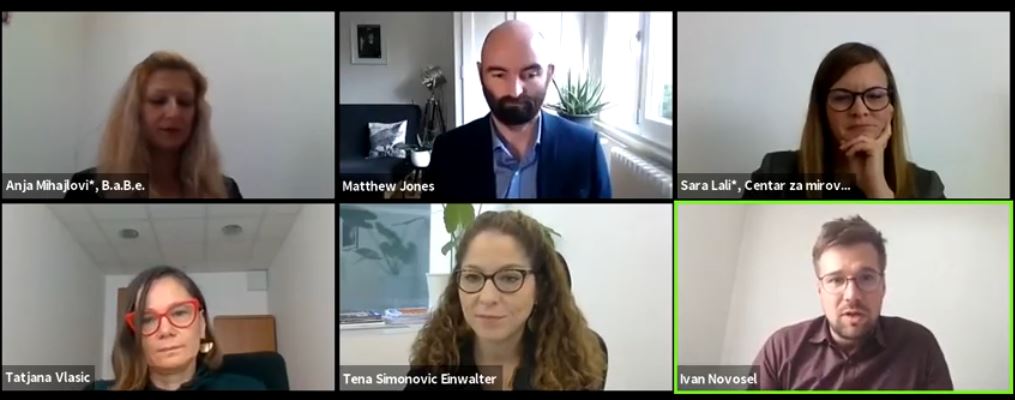The UPR is a unique mechanism within the UN system where each state has the opportunity to demonstrate progress in the protection and promotion of human rights.
Ombudswoman Tena Šimonović Einwalter and the Human Rights House organized an online discussion on 19 October 2021 about the implementation of recommendations addressed to Croatia during the 3rd cycle of the Universal Periodic Review (UPR).
The UPR is a unique UN mechanism in which, along with the important role of the UN Human Rights Council, member states play a key role, as they are the ones issuing recommendations to other member states. This mechanism gives each country the opportunity to demonstrate what actions it has taken to improve the protection and promotion of human rights at the national level.
Ivan Novosel, Program Director of the Human Rights House Zagreb, opened the discussion by noting that Croatia received approximately 200 recommendations in the most recent UPR cycle, covering all categories of human rights—civil, political, social, economic, and cultural—as well as improvements to the overall human rights protection system.
In her opening remarks, Ombudswoman Šimonović Einwalter emphasized that different actors play different roles in human rights protection, and that the Ombudswoman’s institution acts as a double bridge. On one side, it bridges the national and international human rights systems, since the legal framework of the Office includes promoting the signing and ratification of international human rights instruments, their integration into the domestic legal order, monitoring implementation, and reporting on progress and challenges. On the other side, the Ombudswoman’s Office bridges different national actors—linking the government and state bodies with civil society organizations, and also connecting Parliament (as the Ombudswoman is its appointee) with other stakeholders. Moreover, because the Office receives individual complaints—unlike some national human rights institutions (NHRIs) in Europe—it also uniquely incorporates citizens’ voices into these processes.
She also noted that as Croatia’s only national human rights institution with A status, the Office is recognized both at the European and international levels. The institution has been elected by its peers across Europe as a member of the Board of the European Network of National Human Rights Institutions (ENNHRI) and a member of the Global Alliance of National Human Rights Institutions (GANHRI), representing the European region.
During the discussion, Milorad Pupovac, Chair of the Parliamentary Committee on Human Rights, spoke about the Committee’s role in monitoring the implementation of UPR recommendations. He said they regularly monitor and discuss implementation reports, both at regular and thematic sessions. He highlighted key issues of interest to the Committee, including migration, hate speech, historical revisionism, the issue of persons missing from the war, war crimes trials, and growing social and economic inequalities, which significantly reduce the exercise of citizens’ rights across all categories. He identified international mechanisms such as the UPR as important platforms where national states can find opportunities to strengthen their position in the international community.
Boris Milošević, Deputy Prime Minister for Social Affairs and Human Rights, announced the potential establishment of a Government Council for Human Rights, as an interdepartmental body to monitor the human rights situation and related challenges at the national and international levels—also one of the recommendations from the Ombudswoman’s annual reports. He emphasized the Government’s important role in the implementation of UPR recommendations, particularly through the creation and adoption of national strategic and policy documents. He also stressed the importance of including all relevant stakeholders in the UPR process and strengthening the institution of the Ombudswoman.
In her closing remarks, the Ombudswoman reiterated that although all participants have different roles and may sometimes be perceived as opponents, the most can be achieved if they act as allies. Therefore, it is important to work together, with mutual respect, to protect human rights and equality in Croatia. She pointed out that all the issues covered by the recommendations—which must also be viewed in the context of the COVID-19 pandemic and the earthquakes that struck Croatia—will be addressed in her annual report to the Croatian Parliament. These include combating discrimination, freedom of the media, hate speech, migration, the role of human rights defenders and civil society, prison conditions, and others.
Referring to the recommendation on strengthening the institution of the Ombudswoman, she noted that it was issued before the earthquake that damaged the Office’s premises, which have since been declared unusable. As a result, the Office currently operates in inadequate space, which will be a challenge, particularly in the context of upcoming amendments to the Whistleblower Protection Act.
Notably, the discussion—moderated by Deputy Ombudswoman Tatjana Vlašić—was attended by representatives of all key actors involved in preparing the national and parallel reports, as well as in implementing and monitoring UPR recommendations. These included:
- Milorad Pupovac, Chair of the Parliamentary Committee on Human Rights and the Rights of National Minorities
- Boris Milošević, Deputy Prime Minister for Social Affairs and Human Rights
- Matthew Jones, representative of the Geneva-based Human Rights House Foundation
- Romana Kuzmanić Oluić, Advisor to the Minister of Foreign and European Affairs
- Representatives of embassies accredited in Croatia
- Representatives of civil society with UPR experience, including:
- Anja Mihajlović, Program Manager at B.a.B.e.
- Sara Lalić, Program Manager at the Centre for Peace Studies
Also participating were representatives of specialized ombudsperson institutions, who, together with the Office of the Ombudswoman, prepared the Alternative Report within Croatia’s third UPR cycle.
The entire discussion is available on the YouTube channel of the Human Rights House Foundation.


